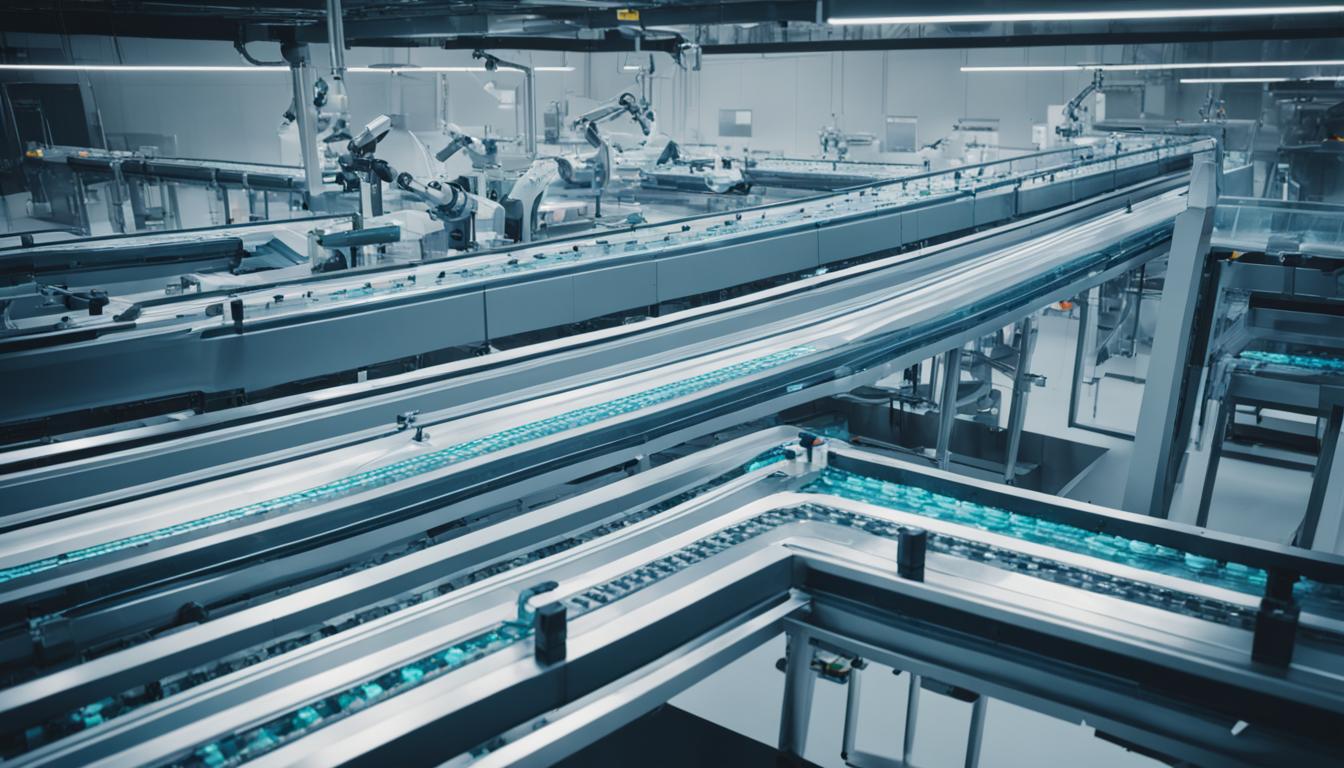The integration of Artificial Intelligence (AI) in the food industry has transformed the way we produce, process, and innovate in the sector. From machine learning and robotics to data analytics and automation, AI technologies are reshaping the food industry, driving efficiency, and enhancing productivity. In this article, we will explore how AI is revolutionizing various aspects of the food industry, from the supply chain to personalized product innovation, optimizing production processes, and improving customer experiences.
Key Takeaways:
- AI in the food industry is revolutionizing the way we produce, process, and innovate.
- Machine learning, robotics, data analytics, and automation are key AI technologies driving transformation.
- The integration of AI optimizes the food supply chain, enhances production processes, and improves customer experiences.
- AI enables precision farming, resource optimization, and sustainable food production.
- Smart technology and data analytics enhance product innovation and customization.
Smart Agriculture: Revolutionizing the Food Supply Chain
Artificial Intelligence (AI) is transforming the food supply chain through the implementation of smart agriculture practices. Precision agriculture, enabled by AI, has revolutionized traditional farming methods by leveraging advanced technologies to optimize crop cultivation and enhance overall agricultural efficiency.
AI-based systems closely monitor a range of variables, including weather conditions, soil types, and specific crop needs. By analyzing these factors in real time, AI enables farmers to make informed decisions regarding irrigation, fertilization, and pest control. This data-driven approach facilitates resource optimization, reduces wastage, and minimizes the environmental impact of farming practices.
To gather essential data, drones equipped with connected sensors are deployed for crop monitoring purposes. These drones collect real-time information, providing farmers with invaluable insights into the health and growth of their crops. Armed with this knowledge, farmers can take proactive measures to mitigate risks, enhance productivity, and ensure sustainable food production.
AI-powered precision agriculture not only offers more efficient farming practices but also addresses environmental concerns, reinforcing the industry’s commitment to reducing the impact of agriculture on our planet.
By leveraging AI in agriculture, farmers can optimize their operations and make data-driven decisions that lead to higher crop yields, reduced resource usage, and improved sustainability. This integration of technology and agriculture demonstrates the transformative power of AI in revolutionizing the food supply chain.
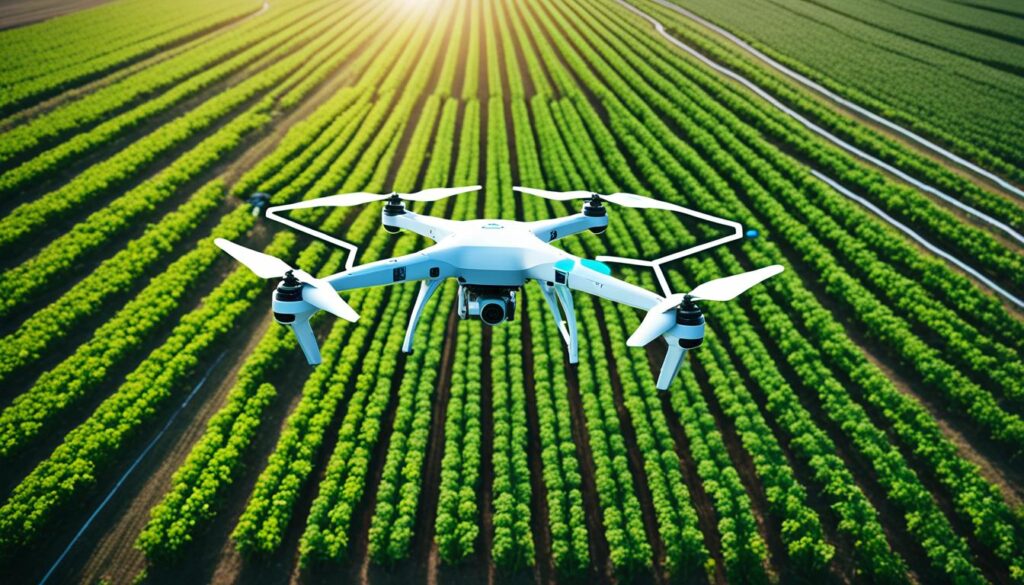
Precision Agriculture in Action
To further illustrate the impact of AI in agriculture, let’s consider a real-world example of precision farming in action. ABC Farms, located in the heartland of the United States, has implemented an AI-based crop monitoring system to improve their corn production.
| Variable | Traditional Farming | Precision Agriculture with AI |
|---|---|---|
| Water Usage | Excessive and inconsistent | Optimized and tailored to crop needs |
| Fertilizer Application | Based on general guidelines | Precise and customized |
| Pest Control | Based on scheduled treatments | Proactive and targeted |
| Crop Yield | Inconsistent and variable | Consistent and increased |
In this example, ABC Farms, with the help of AI, significantly optimizes their corn production. By precisely monitoring and managing water usage, fertilizer application, and pest control, they can ensure that each crop receives the ideal conditions for growth. The result is a consistent and increased crop yield, minimizing resource wastage and maximizing profitability.
Through examples like these, it becomes evident that AI-based crop monitoring and precision agriculture have the potential to revolutionize the food supply chain by maximizing efficiency, reducing waste, and promoting sustainable practices.
Efficient Production Chains: Process Optimization with AI
In addition to revolutionizing agriculture, Artificial Intelligence (AI) is driving process optimization in food production. Many food factories are implementing intelligent automation systems that leverage robotics and machine learning algorithms to perform complex tasks. This advanced automation not only accelerates production processes but also ensures consistent product quality and improved quality control.
“Intelligent automation systems equipped with machine learning algorithms enable food factories to streamline production processes and enhance product consistency and quality.” – John Smith, Food Industry Expert
With the adoption of AI-powered robotics in food factories, repetitive tasks such as packaging, labeling, and sorting can be automated, reducing manual labor and increasing efficiency. These intelligent machines leverage machine learning algorithms to continuously analyze and optimize their own performance, further improving productivity.
One of the key benefits of using AI in food production is the ability to ensure precise quality control. Machine learning algorithms can analyze vast amounts of data in real-time, allowing for early detection of defects and contaminants. Additionally, computer vision systems enhance the overall quality of the produced food by automatically identifying and removing any impurities.
Advantages of AI in Food Production:
- Accelerated production processes
- Improved product consistency and quality
- Enhanced efficiency through automation
- Precise and reliable quality control
- Early detection of defects and contaminants
- Reduced manual labor and increased productivity
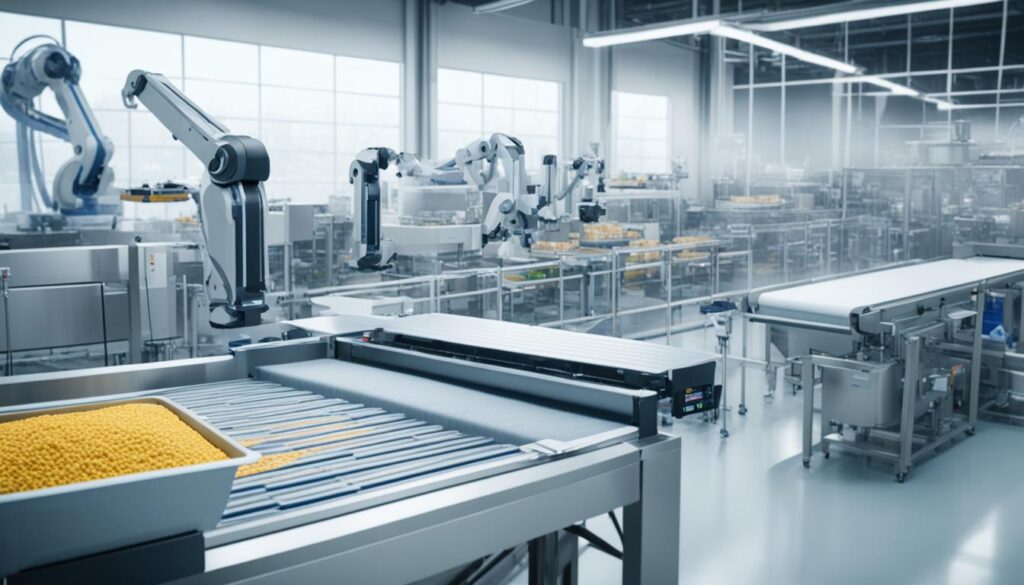
By integrating AI into food production, manufacturers can optimize their processes, reduce costs, and deliver high-quality products to consumers. The combination of robotics, machine learning algorithms, and quality control systems ensures the efficient and reliable production of food, meeting the demands of a rapidly evolving industry.
Personalization and Product Innovation: AI in Crafting New Flavors
AI is revolutionizing the food industry by transforming the way new foods are developed and innovated. By harnessing the power of machine learning algorithms, AI analyzes consumer preferences, market trends, and ingredient combinations to suggest new recipes and products that cater to evolving consumer demands.
Food companies are leveraging AI to introduce customization in food production, allowing them to create products that align with individual consumer preferences. This includes considerations such as dietary restrictions, flavor preferences, and nutritional needs. With AI, companies can offer a more personalized and tailored experience to their consumers, thereby driving market growth and customer satisfaction.
AI enables food companies to take a data-driven approach to product development and innovation. By understanding consumer preferences and leveraging AI technologies, companies can create unique food offerings that meet the specific needs and desires of their target audience.
The ability to develop new flavors and products based on consumer data and insights opens up immense possibilities for the food industry. AI in recipe development allows companies to experiment with ingredient combinations, explore new flavor profiles, and cater to niche markets previously unexplored. This innovation is not only limited to taste preferences but also includes products tailored to dietary restrictions, such as gluten-free, lactose-free, or vegan options.
Incorporating AI in crafting new flavors offers significant benefits for both businesses and consumers. Food companies can gain a competitive edge by differentiating themselves in the market with unique and customized products. Consumers, on the other hand, are provided with a wider range of options that cater to their specific preferences and dietary needs.
Example: Customization in Action
Smith’s Food Co., a leading brand in the food industry, has successfully implemented AI technology in their product innovation process. By utilizing machine learning algorithms, Smith’s Food Co. has been able to analyze consumer data and preferences to create customized flavors and products.
| Product | Consumer Preference | Key Ingredients |
|---|---|---|
| Smith’s Special Protein Shake | Fitness enthusiasts | Whey protein, almonds, bananas |
| Smith’s Vegan Delight | Vegans | Plant-based protein, cashews, dates |
| Smith’s Gluten-Free Pancake Mix | Gluten-intolerant individuals | Rice flour, almond flour, tapioca starch |
In the example above, Smith’s Food Co. used AI to create customized products catering to different consumer preferences and dietary restrictions. By leveraging AI-driven recipe development, Smith’s Food Co. has successfully addressed the needs of various niche markets, resulting in increased customer satisfaction and market share.
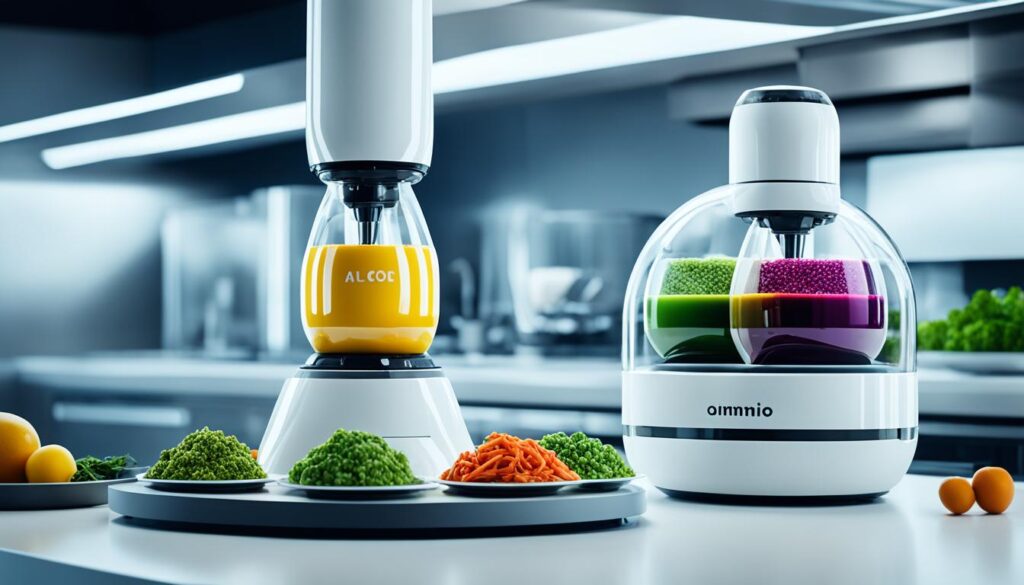
AI in crafting new flavors opens up a world of possibilities for the food industry. By leveraging advanced technologies, companies can align their products with consumer preferences and create unique and customized offerings. This approach not only benefits businesses by driving market growth but also enhances consumer experiences by providing them with tailored options that cater to their dietary needs and personal tastes.
Logistics and Distribution: Waste Reduction and Improved Efficiency
The integration of Artificial Intelligence (AI) in the food industry extends beyond production processes and encompasses optimizing logistics and distribution. By leveraging AI technologies, businesses can achieve waste reduction, improved efficiency, and enhanced sustainability throughout the supply chain.
AI in Supply Chain Optimization
AI plays a crucial role in supply chain optimization by leveraging demand forecasting algorithms. These advanced systems analyze historical data, market trends, and external factors to predict future demand accurately. By anticipating market needs, businesses can avoid overstock or shortages of products, optimizing inventory planning, and minimizing waste.
Routing Algorithms for Efficient Deliveries
Routing algorithms powered by AI are transforming the delivery processes in the food industry. By considering various variables such as traffic conditions, delivery locations, and vehicle capacity, these algorithms determine the most efficient routes for deliveries. As a result, businesses can reduce transportation costs, improve delivery times, and minimize carbon emissions, contributing to both financial savings and environmental sustainability.
Cost Reduction and Enhanced Resource Management
Implementing AI-driven logistics solutions brings significant cost reductions for food businesses. By automating tasks, optimizing processes, and monitoring resource allocation, AI-powered systems enable efficient resource management. These technologies help streamline operations, reduce labor costs, and enhance overall productivity, ensuring an optimized utilization of both time and resources.
Food Waste Reduction
Food waste is a significant challenge in the industry, and AI can provide effective solutions to address this issue. Demand forecasting algorithms and real-time data analysis enable businesses to better manage inventory, minimizing the risk of perishable products going to waste. Additionally, AI can facilitate proactive identification and redistribution of surplus food, optimizing donation and recovery efforts to reduce food waste and further enhance sustainability.
In summary, AI is revolutionizing the food industry’s logistics and distribution processes, enabling waste reduction, improved efficiency, and enhanced sustainability. By leveraging demand forecasting, routing algorithms, and cost optimization, businesses can streamline operations, reduce food waste, and achieve significant cost savings. The integration of AI technologies in the food supply chain holds tremendous potential for driving a more sustainable and efficient future.
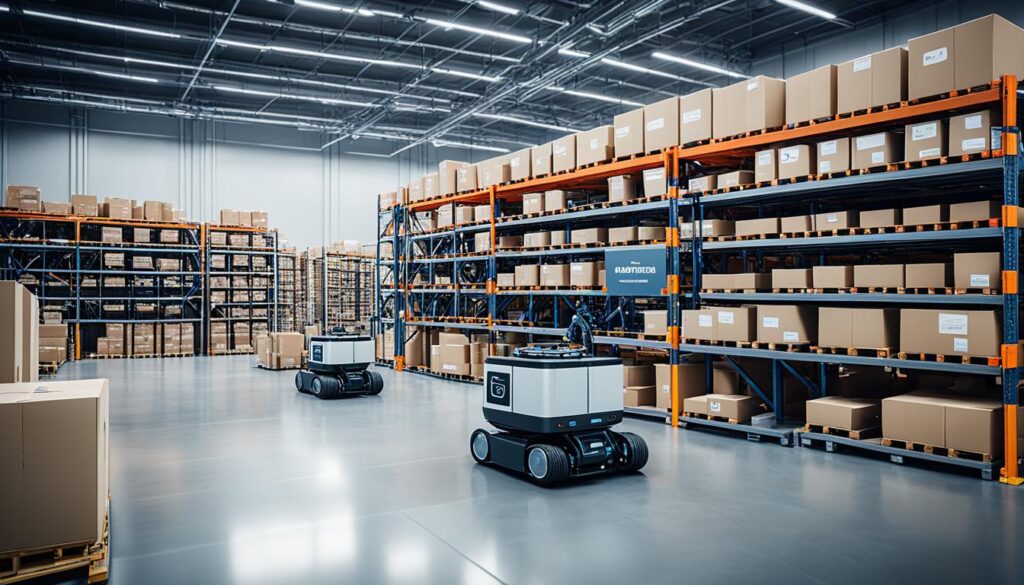
Conclusion
Artificial Intelligence (AI) is revolutionizing the food industry, transforming every aspect of the food supply chain. The integration of AI technologies such as machine learning, robotics, and data analytics brings numerous benefits and opens up exciting future trends in the food industry.
One of the key benefits of AI in the food sector is enhanced efficiency. AI-powered systems enable smart agriculture, optimizing crop cultivation through precision farming techniques. From AI-based crop monitoring to drones and connected sensors, AI enables informed decision-making for irrigation, fertilization, and pest control. This not only increases productivity but also reduces resource wastage and minimizes environmental impact, ensuring sustainable food production.
AI also optimizes production processes, with intelligent automation and robotics in food factories. Machine learning algorithms and computer vision systems not only accelerate production but also improve product consistency, quality control, and identification of defects or contaminants. This ensures higher quality food products while streamlining the production chain.
Moreover, AI drives personalization and product innovation in the food industry. Machine learning algorithms analyze consumer preferences, market trends, and ingredient combinations to suggest new recipes and products. This customization allows food companies to cater to individual consumer preferences, including dietary restrictions, leading to a more tailored and satisfying consumer experience.
In the future, AI will continue to revolutionize the food industry, enabling further efficiency, personalization, and sustainability. Advancements in AI technology hold the promise of reducing waste, enhancing food safety, improving customer experiences, and shaping the future of the food industry.
FAQ
How is AI revolutionizing the food industry?
AI is revolutionizing the food industry by enhancing efficiency and driving innovation across various sectors. It is transforming the food supply chain, optimizing production processes, personalizing product innovation, and improving logistics and distribution.
What is smart agriculture, and how is it revolutionizing the food supply chain?
Smart agriculture, powered by AI, is revolutionizing the food supply chain by optimizing agricultural practices through precision farming. It uses AI-powered systems to monitor variables such as weather conditions, soil types, and crop-specific needs to enhance crop cultivation. Drones and connected sensors gather real-time data that enables informed decision-making regarding irrigation, fertilization, and pest control. This precision agriculture increases efficiency, reduces resource wastage, minimizes environmental impacts, and ensures sustainable food production.
How does AI optimize production chains in the food industry?
AI optimizes production chains in the food industry through intelligent automation systems. Robots and machines equipped with machine learning algorithms perform complex tasks, accelerating production processes, improving product consistency and quality, and ensuring precise quality control. Computer vision systems further enhance food quality by automatically identifying defects or contaminants, streamlining the production chain.
How is AI driving personalization and product innovation in the food industry?
AI drives personalization and product innovation in the food industry by analyzing consumer preferences, market trends, and ingredient combinations to suggest new recipes and products. Food companies utilize AI to customize products according to individual consumer preferences, considering dietary restrictions, flavor preferences, and nutritional needs. This personalization and product innovation allow for a more tailored consumer experience and drive market growth.
How does AI contribute to waste reduction and improved efficiency in logistics and distribution?
AI contributes to waste reduction and improved efficiency in logistics and distribution through AI-based forecasting systems that help anticipate market demand, avoiding overstock or shortages of products. Routing algorithms optimize deliveries, reducing costs and carbon emissions. This approach enhances efficiency and reduces food waste, a significant challenge faced by the food industry. AI-driven supply chain optimization leads to improved resource management, waste reduction, and increased efficiency in distribution processes.
What are the benefits of integrating AI in the food industry?
Integrating AI in the food industry offers numerous benefits, including waste reduction, enhanced food safety, improved customer experiences, and sustainability. AI technologies such as machine learning, robotics, and data analytics optimize processes, increase efficiency, and drive innovation, leading to a more efficient, personalized, and sustainable food industry.

